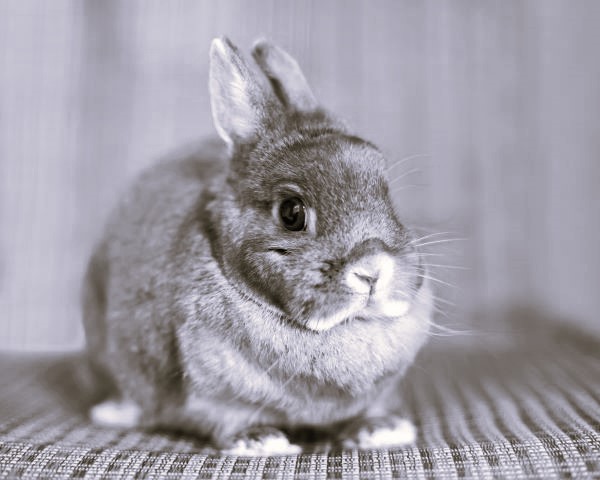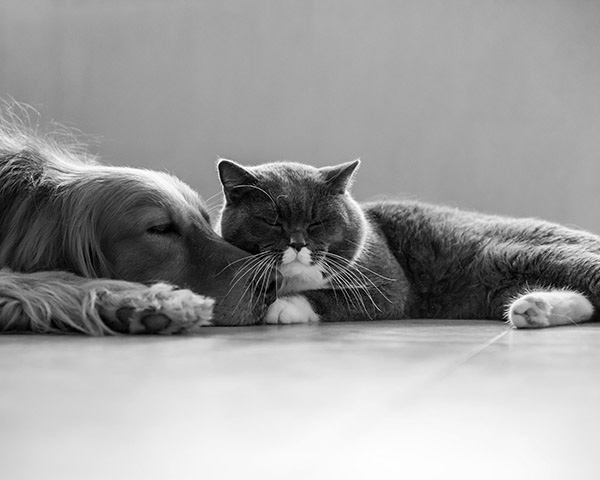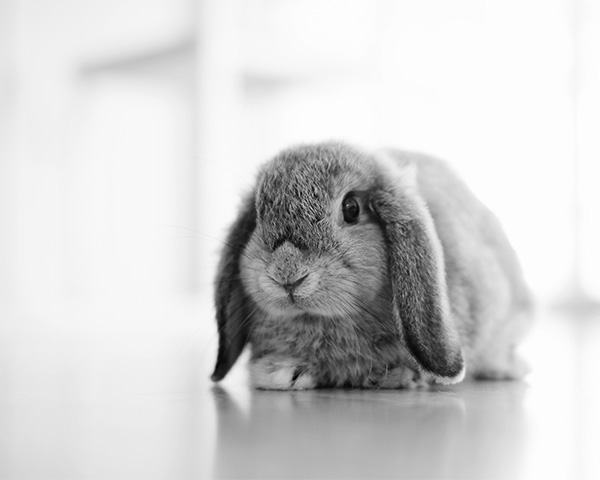Netherland Dwarf rabbit breed information and advice
The Netherland Dwarf rabbit is true to its name, bred in Holland from Hermelin rabbits and wild rabbits in the 1900s. They arrived in the UK in the 1940s and became popular breed due to their miniature size.
Netherland Dwarfs are one of the smallest of all rabbit breeds, with a compact body, large head, flat face, short ears and large eyes. They’re categorized as a “true dwarf” – carrying one normal gene and one dwarf gene.
Ready for your own mini Netherland Dwarf rabbit? Discover everything you need to know about this breed before you bring one home.
Netherland Dwarf facts

| Lifespan | 10 – 12 years |
| How much | £30 – £100 |
| Size | 19 – 23 cm |
| Weight | 0.9 – 1.1 kg |
| Colours | Black, blue-grey, chocolate, lilac, white |
| Grooming | Brush weekly |
| Temperament | Nervous, lively, intelligent |
| Exercise | A minimum of two hours a day |
Insurance for your Netherland Dwarf rabbit
Despite their teeny size, Netherland Dwarfs are full of energy. But they’re delicate and prone to a few health issues. Having rabbit insurance can help to keep your bunny safe and sound, while offering support with treatment and medication costs.
Common health problems that can affect Netherland Dwarf rabbits include:
- Dental malocclusion
- Gastrointestinal stasis (GI)
- Encephalitozoon cuniculi
- Upper respiratory infection (URI)
Like other smaller breeds, Netherland Dwarf bunnies can live up to 12 years, so you can enjoy their company for years to come.
Sainsbury’s Bank Pet Insurance
Cover your Netherland Dwarf with Lifetime cover – our most comprehensive policy designed for rabbits. We’ll cover your bunny for vet bills of up to £2,000 every year, and even pay your vet directly, so you can focus on their treatment.
With Sainsbury’s Bank Pet Insurance, you can claim for:
- Dental
- Physiotherapy
- Advertising and rewards
- Herbal and homeopathic medicine
- Accidents, injuries and poisonings
- Emergency boarding or retreat fees.
Keeping your floppy-eared friend covered is easy, just renew your policy every year and we’ll cover your Netherland Dwarf during its lifetime. You can take out a new policy for your bunny from eight weeks old.
Got more bunnies on the hop or dogs and cats at home? Make the most of our multi-pet insurance discount.
Please note that we won't cover any pre-existing conditions and that terms, conditions, excesses, exclusions and limitations apply.
How to care for a Netherland Dwarf
Netherland Dwarfs are relatively low-maintenance and easy to look after. Keep your fluffy friend happy and healthy with the following care tips.
Feeding and nutrition
Your Netherland Dwarf’s diet should consist of fresh hay, supplementary pellets and veggies like kale, spinach and lettuce. This keeps their digestive system healthy and wears down their teeth, helping to avoid dental issues.
Hay should make up at least 70% of your bunny’s diet. Only give them treats like carrots and fruits sparingly, as Netherland Dwarf rabbits are prone to weight gain. Always provide fresh water in a heavy ceramic bowl or sipper bottle.
Grooming
Netherland Dwarf bunnies have a short and sleek coat that is a dream to groom. A weekly brush to remove loose hair and prevent matting should do the job. Rabbits generally moult twice a year, and their coat will need regular grooming.
During shedding season, use a bristled brush and stroke in the general direction of their fur. Don’t forget to clean inside their tiny ears weekly and check for signs of ear mites. You should also trim their nails every month and avoid bathing your bunny as this can be traumatic for them.
Exercise
Netherland Dwarfs need daily exercise to stay healthy. Give them at least two hours of time to roam outside their cage a day, whether it’s around the house or in a secure outdoor space.
This breed can easily get into mischief. Keep them enriched and entertained with safe chew toys, tubes, cardboard boxes and wicker balls. This will get your bunny moving and give you the chance to bond.
Training
Netherland Dwarf rabbits are thought to behave similarly to cats and dogs. This, and the fact they’re very intelligent, makes them easier to train than other bunnies.
With enough time, patience and positive reinforcement, they can be trained to use the litter box and tricks. You can train Netherland rabbits to stand on hind legs, hop over low obstacles, spin in a circle and more.
Temperament and behaviour
Netherland Dwarf rabbits have a ‘wild’ ancestry, but today, they are playful, energetic and slightly timid. They need a bit of time to adapt to their surroundings – after that they become a friendly, energetic bunny.
The breed can be known to bite, kick and scratch if handled incorrectly, so early socialisation is important. Ultimately, they coexist peacefully with other bunnies and pets. They also bond with human family members and enjoy a little cuddle – making them affectionate pets.
Common health problems
These tiny rabbits are prone to a few health conditions, so it’s important to know what to look out for. Protecting your Netherland Dwarf with rabbit insurance can help to keep them happy and healthy during their lifetime.
Dental malocclusion
Dental malocclusion occurs when the top and bottom jaws don’t align properly. This condition is inherited in Netherland Dwarfs and other brachycephalic breeds with a short, flat face.
Their facial structure can cause crowded teeth and malocclusion of the upper and lower jaws. The teeth can overgrow and form sharp points that damage the gums and inside the cheeks.
Rabbits with malocclusion may have a decreased appetite, paw at the face or have swelling along their cheeks. Surgical removal of the teeth and regular trimming are common treatment options.
Gastrointestinal stasis (GI)
GI stasis is when the rabbit’s digestive system slows or stops functioning completely. This causes a build-up of bacteria which creates excessive gas, or bloating. Rabbits with GI stasis will experience severe pain and may not eat or drink.
The condition is serious and potentially life-threatening, caused by dehydration, stress and a lack of exercise. Treatment ranges from fluid therapy and pain relief to antibiotics and mobility medication. A high-fibre diet with plenty of hay can help to prevent GI stasis.
Encephalitozoon cuniculi
Netherland Dwarf rabbits are also susceptible to a number of parasites, including E. cuniculi. This parasitic infection affects the nervous system, kidneys and eyes. It is transmitted by inhaling or ingesting spores in an infected rabbit’s urine.
Symptoms of E. cuniculi include head tilt, weight loss, eye twitching or rolling, and sometimes paralysis. If you notice any signs, take your bunny to the vet right away. They will usually prescribe anti-inflammatory medications and dewormers.
Upper respiratory infection (URI)
Rabbits generally have sensitive respiratory systems. Their teeth constantly grow, and sometimes their roots grow upward into their nasal passages. This can cause inflammation and bacterial infections.
With their shortened airways, Netherland Dwarf rabbits are more prone to URIs than other breeds. They may show signs such as difficulty breathing, loss of appetite, weepy eyes and sneezing or snuffles. Keeping your bunny in a clean and spacious enclosure can help to reduce their chance of developing a URI.
So, is a Netherland Dwarf right for you?
If you’re looking for a bunny that loves human companionship, then a Netherland Dwarf might be for you. They’re a nervous breed, so don’t expect endless cuddles, and be mindful when handling them.
Netherland Dwarf rabbits are tiny in nature but big in personality. These bunnies are easily trained, love to play and simple to groom. They also have standard dietary requirements. Shower them with enough love, hay and toys and they will be your best friend for years to come.
Frequently asked questions
How long do Netherland Dwarf rabbits live?
The average Netherland Dwarf rabbit lifespan is around 10-12 years on average. Protecting your bunny with rabbit insurance can be the first step to helping them lead happy and healthy lives.
Do Netherland Dwarf rabbits like to be held?
Netherland Dwarf rabbits don’t mind the odd cuddle, but they generally don’t like to be picked up or held. They’re a skittish and nervous breed, so sudden handling can frighten them. Early socialisation can help them get used to being held.
Can Netherland Dwarf rabbits live alone?
Netherland Dwarf rabbits prefer to live with others. Rabbits are social creatures that evolved to live in groups. Without company, your bunny can become bored and unhappy, leading to physical and behavioural issues.

Browse our guides
Choose from our list of helpful guides and information

Explore rabbit breeds
Find out how to keep your rabbit healthy and happy

Cat breed guides
How to care for your cat, common health problems and more
Terms and conditions
Important information
* The discount is based on information related to you and the Sainsbury’s and Sainsbury’s Bank transactions linked to your Nectar account. For more information on how we use your data, go to sainsburysbank.co.uk/privacy
Sainsbury's Bank plc, Registered Office, 33 Charterhouse Street, London, EC1M 6HA (registered in England and Wales, no 3279730) is authorised by the Prudential Regulation Authority and regulated by the Financial Conduct Authority and the Prudential Regulation Authority (register no. 184514).
Sainsbury's Supermarkets Ltd is an appointed representative of Sainsbury's Bank plc. Sainsbury's Bank plc acts as an introducer to Pinnacle Insurance Ltd who is authorised by the Prudential Regulation Authority and regulated by the Financial Conduct Authority and the Prudential Regulation Authority (register number 110866). Registered office: 4th Floor, Limelight, Elstree Way, Borehamwood, Hertfordshire, WD6 1JH. Sainsbury’s Bank Pet Insurance is arranged, administered and underwritten by Pinnacle Insurance Ltd. Sainsbury's Bank plc and Pinnacle Insurance Ltd are not part of the same corporate group.
We do not provide personal recommendations to customers.
